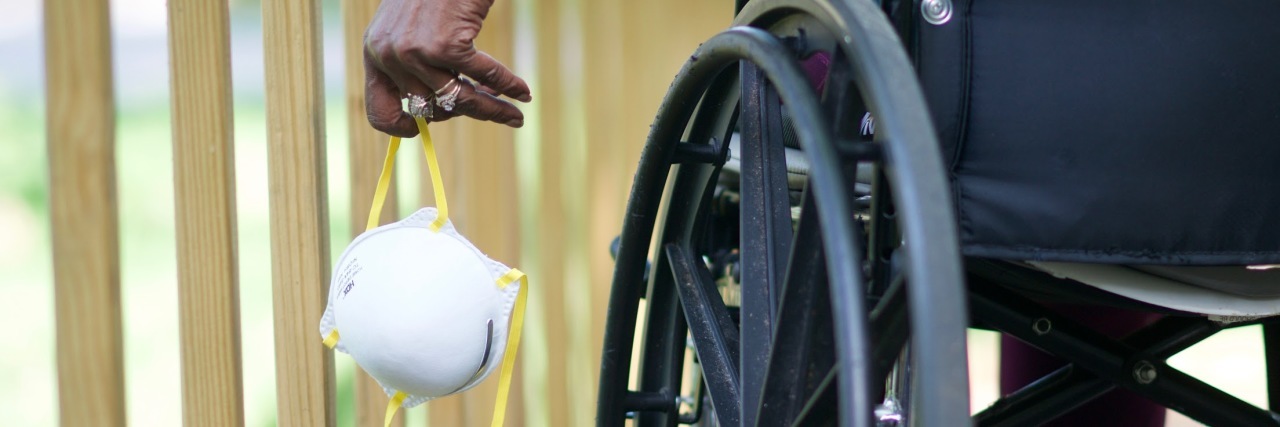According to the WHO, COVID-19 has tragically claimed more than 1.5 million lives. Those with pre-existing health conditions (such as heart disease, diabetes and respiratory conditions) are at higher risk of complications and death due to COVID-19.
However, not every disability is on the list of underlying conditions that qualify people for the stage one vaccination group. On the CDC website, conditions are added when there is enough scientific evidence to support an addition to the list. The current conditions are: cancer, chronic kidney disease, COPD, Down syndrome, heart conditions, immunocompromised state from solid organ transplant, obesity, pregnancy, sickle cell disease, smoking, type 2 diabetes. Disabled people account for six out of 10 COVID-19 deaths. Nevertheless, the entire disabled community is not all in the first group to get the vaccine. Many will have to wait. Many will have to stay in their houses and wait. Just as their lives were before COVID and like their lives will continue through the vaccination process, when the vaccinated able-bodied are OK to go out and play, a majority of the disabled community will be at home, waiting. That is if they don’t become one of the six out of 10.
Can we think about ways we can do better to protect disabled people? Will we be concerned at all moving forward about how many elderly and disabled people in nursing facilities and at home, isolated before and after the pandemic, will fare as the world goes back to their able-bodied lives, free to move about with other vaccinated family and friends, strangers and co-workers? Can we think of the family caregivers who, perhaps even vaccinated and able-bodied, continue to be at home, 24/7, caring for their child, mate, parent, maybe all three, while the world forgets they too would like to be on vacation, have a visit, a meal or just go to a movie? Will we remember or will we be like that spring that was wound so tight that once released, goes so far from its position that it’s impossible to ever find it and place it back?
How large has the pandemic made your love for humanity? Is your heart wide open, or has it become narcissistic and small?
Think about this: beyond the races, the economic status and sex, when it comes to equity, justice and being treated with dignity and respect, the disabled community is frequently overlooked and dismissed as expendable and irrelevant in the world. Unlike that spring, they can’t be released from their position in society. Or can they?
The disabled community is underrepresented in the workplace, in entertainment, in public and in the hearts and minds of people. Moreover, despite the ADA and accessibility requirements, the disabled community is still denied access to the majority of opportunities. And yet, they are also routinely looked at with disdain due to the misconception that they are coasting along through life on tax dollars and military benefits.
That is a lie.
Society could do better. But it won’t, because the truth is, simply, it just doesn’t care enough to put in the effort. Right? Not even for the isolated or disabled person personally known or their caregivers.
If you think I’m wrong, adjust your heart spectacles as you navigate through your next shopping or activity outside your home. Pretend I’m there, with you in the passenger seat, pointing out able-bodied people: mindlessly using the larger bathroom stall, taking the elevator when a disabled person is waiting, or worse, stepping off in front of them while getting off at the same time, using the wheelchair ramp, leaving carts in the parking lots and aisles for wheelchairs, taking accessible parking spaces, due to lazy and resentful feelings and behaviors that disabled people are taking up those precious few minutes they’re losing in the hectic day. Then consider, when that was done, how many hours and energies were taken away from that disabled person, and how many disabled people came after them?
I ask you, will disabled people ever be looked at as precious and enough of a valuable asset in the world to warrant being seen as human beings with all the same emotions, hopes, dreams and needs for stimulating friendship and meaningful relationships as able-bodied people?
When will disabled people be on the receiving end of societal kindness and protection?
The disabled people of the world don’t expect preferential treatment. They certainly don’t want your pity. We just ask that you see us, truly see us as part of the human community and acknowledge that we have every right to live our best life as anyone else.
Getty image by Niq Steele.

